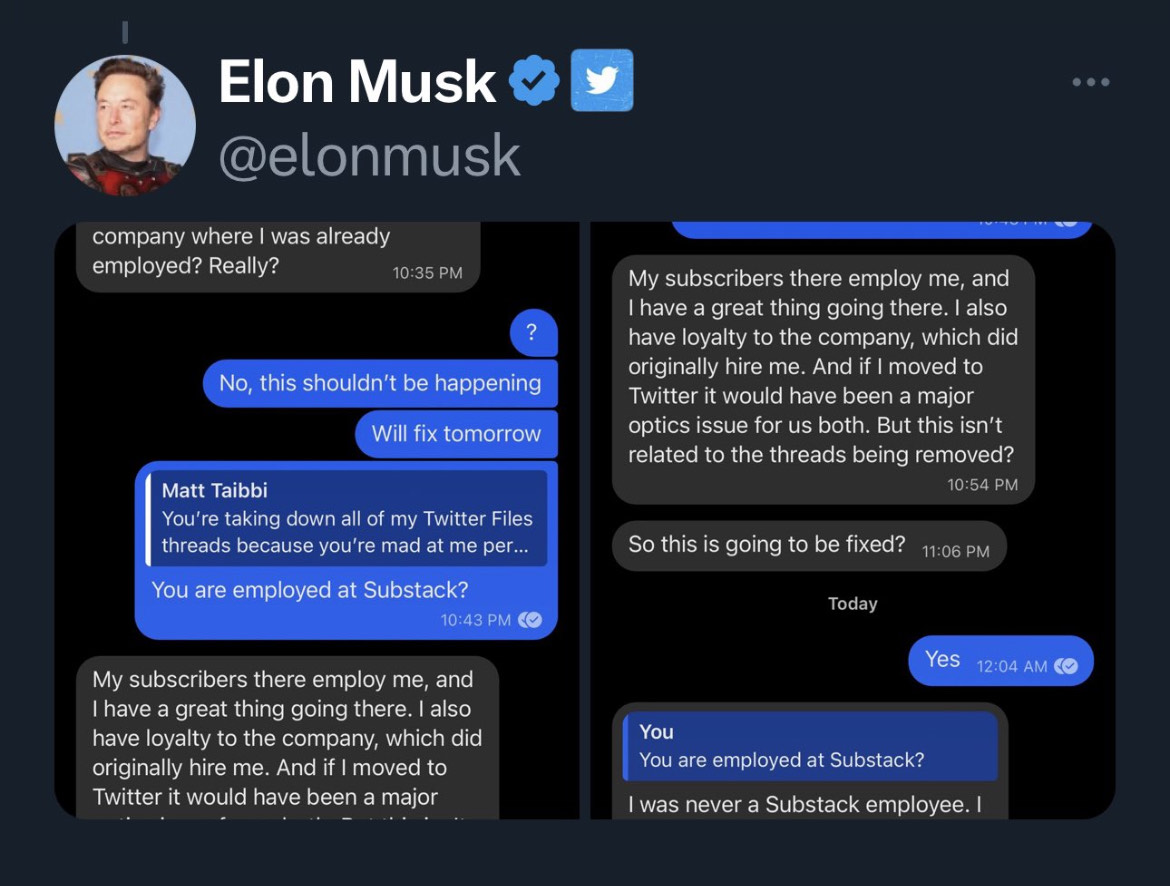Solomon: Why Does Elon Musk Want to Go to War?
Why should the close to 400 million Twitter users care that owner Elon Musk and Twitter Files journalist Matt Taibbi have evidently decided to go to war?
Elon Musk posted private DMs between him and Taibbi.
This same person has access to all of your private DMs.
— Bradley P. Moss (@BradMossEsq) April 11, 2023
Here are the since-deleted DMs:

Any social media platform should be measured by its worst and most vulnerable moments. The implosion of Twitter’s Twitter Files is one of those important moments.
The Twitter Files are a series of internal Twitter documents that were made public by Musk in December. These documents include thousands of Slack discussions and emails between Twitter employees about their content policies and moderation decisions.
Some of the documents show Twitter’s policy team debating various issues, while others capture fraught moderation calls. The Twitter Files have been the subject of much discussion and analysis. Some argue that they reveal a progressive agenda at Twitter, while others see them as evidence of censorship and bias.
Last week, Taibbi and Mehdi Hasan had an extremely tense conversation during an interview on MSNBC regarding Taibbi’s reporting on the Twitter Files, Hunter Biden and Musk. Hasan challenged Taibbi on his reporting during the interview and subsequently at length on Twitter.
The soap opera then intensified when Twitter banned Substack links a day after the Taibbi interview.
Twitter has restricted the promotion and visibility of tweets with links to Substack posts and has started marking links to Substack as unsafe. Twitter is also censoring Substack links by making the posts impossible to reply to, like or retweet. While quote-tweeting works, simply pressing the retweet button on a tweet with a Substack link will not work.
The problem here for Taibbi is that he earns over half a million dollars a year through his Substack subscriptions. This is another big loss for Musk, who is forcing journalists such as Taibbi to choose between the platforms.
Let’s be honest — if anyone should know Elon Musk by this point, it’s Matt Taibbi. In choosing Substack and the revenue that flows to him from it, Taibbi knowingly started a war with Musk, which is where things stand today.
Where this all goes from here is from bad to worse. If Hasan’s goal on MSNBC last week was to drive a wedge between Taibbi and Musk and to discredit both, the show itself was maybe 20 percent successful at most. But the subsequent jockeying between Musk and Taibbi accomplished what Hasan couldn’t; in many circles, the Twitter Files have now been discredited and most if not all of Taibbi’s shine is gone.
From a practical perspective, none of this needed to happen.
As attorney David Gelman points out, “From a legal perspective, if any media platform restricts publication or republication from other sources it places artifical limits on earning potential. Given that independent journalists cobble together revenue today from a range of sources, any platform that makes inclusion an all-or-nothing proposition is limiting their own business model.”
That’s exactly what Musk has done here.
Twitter’s role should be to amplify what journalists and writers and all creators are doing on many sites. If Twitter can successfully do this for its still-massive audience, it would be seen as a huge ally by the Substacks of the world rather than a binary competitor.
The views expressed in this opinion article are those of their author and are not necessarily either shared or endorsed by the owners of this website. If you are interested in contributing an Op-Ed to The Western Journal, you can learn about our submission guidelines and process here.
Truth and Accuracy
We are committed to truth and accuracy in all of our journalism. Read our editorial standards.












